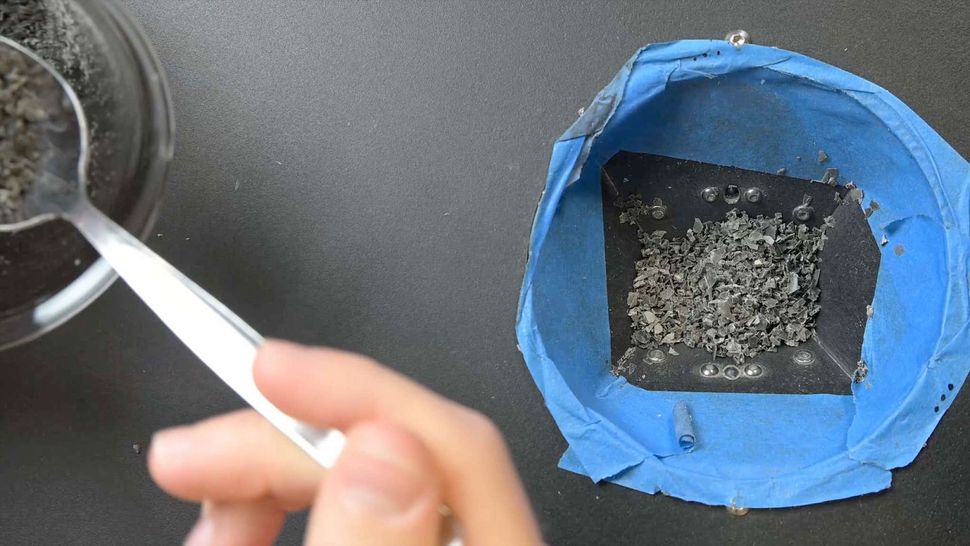
‘ESA Space Bricks’ landing at Lego Stores could help build real Artemis moon base (Image Credit: Space.com)
Scientists may have just found the “building bricks” for future moon bases in the toy store — and the public can soon see them there, too.
European Space Agency (ESA) researchers discovered more than inspiration when they looked at Lego sets while working on possible designs for habitats, launch pads and other structures for astronauts to use on the moon as part of NASA’s Artemis program. Using the iconic plastic pieces as a model, the ESA team used 3D printers to create similar bricks made in part from meteorite to show that the tubes at the bottom wedge together with the studs at top, just like the toy.
“My team and I team love creative construction and had the idea to explore whether space dust could be formed into a brick similar to a Lego brick so we could test different building techniques,” said Aidan Cowley, ESA’s science officer, in a statement released by Lego on Tuesday (June 18). “The result is amazing, and, whilst the bricks may look a little rougher than usual, importantly the clutch power still works, enabling us to play and test our designs.”
The resulting “ESA Space Bricks” will next go on display for three months beginning June 24 at select Lego Stores in the United States, Canada, the United Kingdom, Germany, France, Denmark, Spain and Australia, as well as at the Lego House in Billund, Denmark (see below for a full list of locations).
“No one has ever built a structure on the moon, so we have to work out not only how we build them but what we build them out of, as we can’t take any materials with us,” said Cowley.
When on the moon, the natural resource to use would be regolith — the layer of loose rock and dust that covers the lunar surface. A limited amount of authentic regolith is on Earth, having been brought back by the six Apollo flights that landed U.S. astronauts on the moon, three robotic Russian Luna missions and China’s Chang’e 5 sample return probe. (Chang’e 6 is set to return to Earth the first material collected from the moon’s far side, on June 25 or thereabouts.)
Related: The moon on Earth: Where are NASA’s Apollo lunar rocks now?

As a stand-in for regolith, the ESA team used the dust from a 4.5 million-year-old meteorite, which was added to polylactide (a biodegradable polymer) and lunar regolith simulant to form the feedstock for their 3D printers. The meteorite was originally found in Northwest Africa 24 years ago. Classed as an L3-6, the rock was a brecciated stone, comprised of large metal grains, inclusions, chondrules and elements.
With their structural testing complete, the ESA Space Bricks have been given a new mission: “to inspire the builders of tomorrow of how Lego brick building can help solve out-of-this-world problems.”
“With the ESA team using the Lego System-in-Play to advance space travel, it shows kids the sky really is the limit when it comes to Lego brick building, and we hope it encourages children to have a go at building their own space shelters!” said Daniel Meehan, creative lead at the Lego Group.
Fifteen of the ESA Space Bricks are landing on display at Lego locations around the world, including:
United States
- The LEGO Store, Mall of America, Bloomington, Minnesota
- The LEGO Store, Disney Springs, Florida
- The LEGO Store, Water Tower Place, Chicago
- The LEGO Store, Disneyland Resort, California
- The LEGO Store, 5th Avenue, New York
Canada
- The LEGO Store, West Edmonton
United Kingdom
- The LEGO Store, Leicester Square, London
Germany
- The LEGO Store, München Zentrum
- The LEGO Store, Cologne
Denmark
- The LEGO Store, Copenhagen
- LEGO House, Billund
Spain
- The LEGO Store, Barcelona
France
- The LEGO Store, Paris
Netherlands
- The LEGO Store, Amsterdam
Australia
- The LEGO Store, Pitt Street Mall, Sydney

ESA has partnered with NASA to carry out the Artemis program, which has the goal of returning humans to the moon for the first time since the Apollo missions more than 50 years ago. Together with Canada, Japan and the United Arab Emirates (UAE), the 22 ESA member states are supporting the assembly of the Gateway, a human-tended lunar orbit platform that will enable landing astronauts at the moon’s south pole.
Follow collectSPACE.com on Facebook and on Twitter at @collectSPACE. Copyright 2024 collectSPACE.com. All rights reserved.





